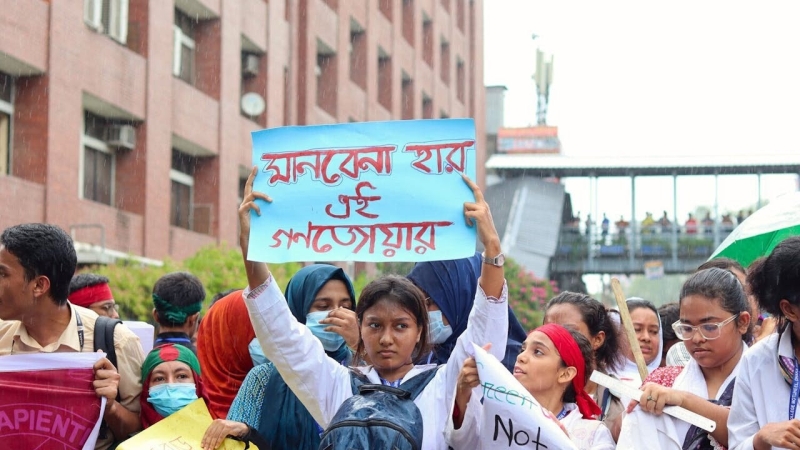- A costly bridge in Manikganj remains idle sans approach roads |
- Dhaka’s air quality records ‘unhealthy’ amid fog Saturday morning |
- Record low ADP execution rate clouds performance in 2025 |
- Special prayers held nationwide for Khaleda after Jumma prayers |
- Vandalism at Chattogram Airport for food after flight cancellations |
2024 Year in review

A young female protester holds up a sign that reads - The mass tide will not yield in defeat - in Bengali during the summer uprising that ousted Prime Minister Sheikh Hasina. Wikimedia Commons. _11zon
Samantha Ho
Earlier this year, a student movement to abolish the quota system for government jobs in Bangladesh quickly escalated into a revolution that ousted the country's entrenched prime minister. Four months on, an interim government has taken over and there are positive signs the nation is on the road to recovery.
As the country opens up for business, its special envoy Lutfey Siddiqi to Bangladesh's chief adviser and Nobel laureate Muhammad Yunus, who leads the interim regime, says that any foreign investment and trade push must take into consideration greater social inclusivity, particularly for women and youth. Siddiqi was speaking at the Orange Forum hosted by IIX in partnership with Eco-Business in Singapore this month.
Even as we celebrate the progress in Bangladesh, many other areas in Asia remain mired in conflict. In post-coup Myanmar, monsoon rains that triggered heavy flooding in August have complicated economic recovery efforts. New research shows that the double threat of military violence and extreme weather events have left women lacking social support and vulnerable to further harm. At the International Court of Justice's climate hearings last week, another major conflict – the Israel-Gaza war – was in the spotlight as the state of Palestine demanded that countries involved in armed conflicts and occupations be held accountable for the climate impacts of these activities, prompting the stark question – who is responsible for the emissions of wars?
Climate and greenwashing litigation is also on the rise. In one of our year-ender stories, we look at the brands that have been called out for greenwashing this year, with some facing court cases.
(Samantha Ho is the Regional correspondent of eco-business weekly, Singapore)

